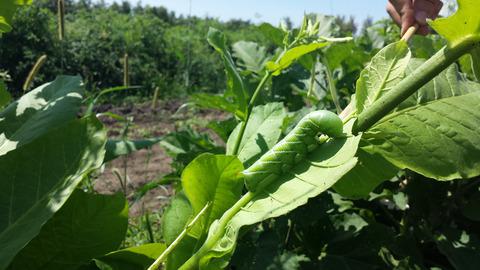当前位置:
X-MOL 学术
›
Funct. Ecol.
›
论文详情
Our official English website, www.x-mol.net, welcomes your
feedback! (Note: you will need to create a separate account there.)
Toxin or medication? Immunotherapeutic effects of nicotine on a specialist caterpillar
Functional Ecology ( IF 4.6 ) Pub Date : 2020-12-16 , DOI: 10.1111/1365-2435.13743 Michael Garvey 1, 2 , Justin Bredlau 3, 4 , Karen Kester 4 , Curtis Creighton 5 , Ian Kaplan 2
中文翻译:

毒素还是药物?尼古丁对专业毛毛虫的免疫治疗作用
更新日期:2020-12-16
Functional Ecology ( IF 4.6 ) Pub Date : 2020-12-16 , DOI: 10.1111/1365-2435.13743 Michael Garvey 1, 2 , Justin Bredlau 3, 4 , Karen Kester 4 , Curtis Creighton 5 , Ian Kaplan 2
Affiliation

|
- A core tenant in the field of ecological immunology is that immune responses trade off with other physiological functions due to resource allocation costs. Caterpillars, for example, tend to exhibit reduced immune responses when reared on more toxic food plants due to a cost from detoxifying or sequestering secondary metabolites, also known as the ‘vulnerable host hypothesis’. However, support for this hypothesis is mixed, and studies have not yet mechanistically isolated the relative contributions of total plant defences, specific metabolites or macro‐nutritional quality.
- We used the tobacco hornworm Manduca sexta, a specialist herbivore on plants in the nightshade family (Solanaceae), to investigate trade‐offs in immune response. This system is ideal given the availability of solanaceous plant lines varying in general (i.e. jasmonate‐induced) and specific (i.e. nicotine) resistance traits. We also applied a geometric diet stoichiometry approach to examine how phytochemical toxicity and nutritional quality interactively impact insect immunity and performance. We predicted that as plant toxicity increased, immune activity and herbivore performance would decrease.
- Increasing food plant toxicity reduced insect growth and development, as predicted, but contrary to our hypothesis, plant toxicity did not trade off with immune parameters. Surprisingly, specific plant chemicals, in this case nicotine, appeared immunotherapeutic, stimulating the phenoloxidase (PO) immune response of M. sexta. Available nutrients in artificial diets, mainly protein, also strongly impacted insect growth, but did not affect PO activity, while diets supplemented with nicotine enhanced the PO and melanization response.
- This work highlights how specific secondary metabolites, and not overall plant toxicity, impact the immune response. Importantly, our data also suggest an alternative mechanism (i.e. immune enhancement) for reduced parasitoid performance when reared from hosts on toxic plants via tritrophic interactions.
中文翻译:

毒素还是药物?尼古丁对专业毛毛虫的免疫治疗作用
- 生态免疫学领域的核心租户是,由于资源分配成本,免疫反应与其他生理功能之间需要权衡取舍。例如,由于解毒或螯合次生代谢产物(也被称为“脆弱宿主假说”)而付出的代价,当毛毛虫在毒性更高的食用植物上饲养时,往往表现出降低的免疫反应。然而,对这一假设的支持是混杂的,并且研究还没有从机械上分离总植物防御,特定代谢产物或宏观营养质量的相对贡献。
- 我们使用茄属植物茄科(茄科)中的一种特殊食草动物烟草香(Sandacea sexta)来研究免疫反应中的取舍。考虑到茄科植物品系的一般性(即茉莉酸酯诱导的)和特定性(即尼古丁)抗性性状的变化,该系统是理想的。我们还采用了几何饮食化学计量方法,以检验植物化学毒性和营养质量如何相互作用地影响昆虫的免疫力和性能。我们预测,随着植物毒性的增加,免疫活性和草食动物的性能将会降低。
- 如预测的那样,增加食用植物的毒性会降低昆虫的生长和发育,但是与我们的假设相反,植物的毒性并未与免疫参数相抵触。出人意料的是,特定的植物化学物质,在这种情况下尼古丁,出现免疫治疗,刺激的酚氧化(PO)的免疫应答烟草天蛾。人工日粮中的可用营养素(主要是蛋白质)也强烈影响昆虫的生长,但不影响PO活性,而日粮中补充尼古丁可增强PO和黑化反应。
- 这项工作强调了特定的次生代谢产物而不是整个植物的毒性如何影响免疫反应。重要的是,我们的数据还提出了一种替代机制(即免疫增强),当通过三养相互作用从有毒植物的宿主饲养时,降低寄生寄生虫的表现。











































 京公网安备 11010802027423号
京公网安备 11010802027423号